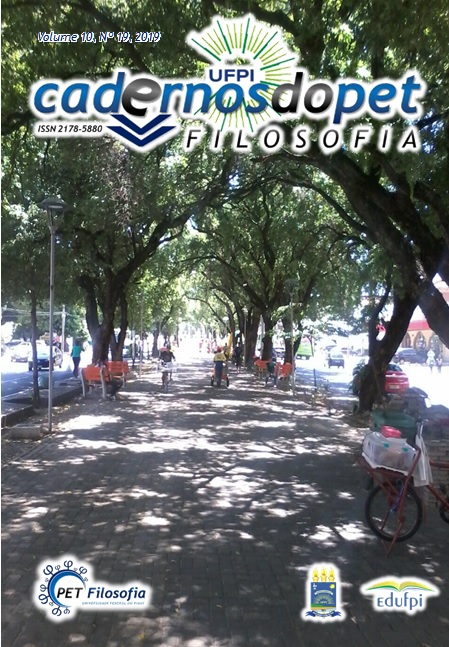A TEORIA DO DUPLO PROCESSO CEREBRAL DE J. GREENE
DOI:
https://doi.org/10.26694/pet.v10i19.1964Palabras clave:
emoções, tomada de decisão, tribalismo, moralidadeResumen
O presente texto tem como finalidade sumarizar o modelo cognitivo de Joshua Greene, que tende a perceber as decisões morais influenciadas tanto pelos processos automáticos como também pelos processos manuais, que nos dizem o que fazer, mas que também tencionam entre interesses individuais e coletivos, ou seja, tribalistas. No geral, a pesquisa de Greene, segue e apoia a afirmação de que a razão não é causa suficiente para o juízo ou comportamento moral - a emoção jaz na estrutura.
Citas
ALMADA, Leonardo Ferreira. Neuropeptídeos e Neuroquímica Cerebral: o Background Conceitual da Neurociência Afetiva. Poros (Uberlândia), v. 1, p. 26-41, 2009.
ALMADA, Leonardo Ferreira. A Neurociência Afetiva como Orientação Filosófica: Por uma ressignificação Neurofilosófica do Papel das Emoções na Estrutura do Comportamento. Educação e Filosofia, v. 25, n. 49, p. 201-226, 2011.
BARON, J., GREENE, J. Determinants of insensitivity to quantity in valuation of publics goods: Contribuition, warm glow. Budget constraints availability, and prominence. Journal of Experimental Psychology: Apllied 2(2):107, 1996.
BERNHARD, H., U. FISCHBACHER, et all. Parochial altruism in humans. Nature 442 (7105): 912-915, 2006.
BRATMAN, M. Intention, plans, and practical reason. Cambridge, MA: Harvard University Press, 1987.
DAMASIO, Antônio. Em Busca de Espinosa: prazer e dor na ciência dos sentimentos. São Paulo: Companhia das Letras, 2004.
DAMASIO, Antônio. E o Cérebro Criou o Homem. São Paulo: Companhia das Letras, 2009.
DAMASIO, Antônio. O Erro de Descartes: Cérebro, Razão e Emoção. São Paulo: Companhia das Letras, 2012.
DAMASIO, Antônio. O Mistério da Consciência: do corpo e das emoções ao conhecimento de si. São Paulo: Companhia das Letras, 2015.
DE DREU, C. K. W., L. L. GREER, et al. The neuropeptide oxytocin regulates parochial altruism in intergroup conflict among humans. Science 328(5984): 1408-1411, 2010.
GREENE, Joshua; SOMMERVILLE, R. Brian; LEIGH, Nystrom; JOHN, M. Darley; JONATHAN, D. Cohen. An fMRI Investigation of Emotional Engagement in Moral Judgment. Science, v. 293, p. 2015-2107, 2001.
GREENE, Joshua; HAIDT, Jonathan. How (and where) does moral judgment work? Trends in Cognitive Sciences, v. 6, n. 12, p. 517-523, 2002.
GREENE, Joshua; NYSTROM, Leigh; EGELL, Andrew; DARLEY, John; COHEN, Jonatham. The Neural Bases of Cognitive Conflict and Control in Moral Judgment. Neuron, v. 44, p. 389-400, 2004.
GREENE J. Emotion and Cognition in Moral Judgment: Evidence from Neuroimaging. In: Changeux JP. , Damasio A.R., Singer W., Christen Y. (eds) Neurobiology of Human Values. Research and Perspectives in Neurosciences. Springer, Berlin, Heidelberg, 2005.
GREENE, Joshua. Why are VMPFC patients more utilitarian? A dual-process theory of moral judgment explains. Trends in Cognitive Sciences, v. 11, n. 8, p. 322-323, 2007.
GREENE, Joshua; CUSHMAN, Fiery; STEWART, Lisa; LOWENBERT, Kelly; NYSTROM, Leigh; JONATHAN, Cohen. Pushing Moral Buttons: The Interaction Between Personal Force and Intention in Moral Judgment. Cognition, v. 111, n. 3, p. 364-371, 2009.
GREENE, Joshua. Moral tribes: Emotion, reason and the gap between us and them. New York, NY: Penguin, 2013.
GREENE, J. D., Beyond Point-and-Shoot Morality: Why Cognitive (Neuro)science Matters for Ethics. Ethics, 124(4), 695-726, 2014.
GREENE, Joshua. Beyond Point-and-Shoot Morality: Why Cognitive (Neuro)Science Matters for Ethics. Law & Ethics of Humas Right, v. 9, n. 1, p. 141-172, 2015.
GREENE, J.D. Solving the Trolley Problem. A Companion to Experimental Psychology. John Wiley & Sons, 2016.
GOLDMAN, A. I. (1970). A theory of human action, Prentice-Hall Englewood Cliffs, NJ, 1970.
HAIDT, Jonathan. The Righteous Mind: Why Good People are Divided by Politics and Religion. New York, NY: Random House, 2012.
HAMLIN, J KILEY & WYNN, Karen & BLOOM, Paul. Social Evaluation by Preverbal Infants. Nature. 450. 557-9. 10.1038/nature06288, 2007.
KAHNEMAN, D. “Thinking, Fast and Slow”, New York: Farrar, Straus & Giroux. Obra traduzida para o português: “Rápido e Devagar”, ed. Objetiva, 2011.
KAHNEMAN, D., D. SCHKADE, et al. Shared outrage and erratic rewards: The psychology of punitive damages. Journal of Risk and Uncertainty 16: 49–86, 1998.
LEDOUX, Joseph. O Cérebro Emocional: os misteriosos Alicerces da Vida Emocional, ed. Objetiva, 1996.
MENDEZ, M. F., E. ANDERSON, et al. An investigation of moral judgement in frontotemporal dementia. Cognitive and Behavioral Neurology 18(4): 193-197, 2005.
MIKHAIL, J. Elements of moral cognition: Rawls’ linguistic analogy and the cognitive science of moral and legal judgment. New York: Cambridge University Press, 2011.
OCHSNER, K. N., S. A. BUNGE, et al. Rethinking feelings: Na fMRI study of the cognitive regulation of emotion. Journal of Cognitive Neuroscience 14(8): 1215-1229, 2002.
RAND, D. G., J. D. GREENE, et al. Spontaneous giving and calculated greed. Nature 489(7416):427-430, 2012.
SINGER, T., B. SEYMOUR, et al. Empathy for pain involves the affective but not sensory components of pain. Science 303(5661): 1157-1162, 2004.
THOMSON, J. The trolley problem. Yale Law Journal 94 (6): 1395-1415, 1985.








